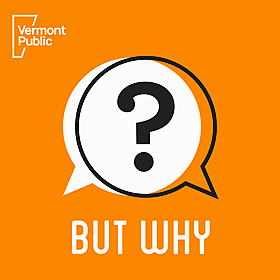
Do people eat bugs?
7 June - 14 minsYes! In many parts of the world, insects are a regular part of people’s diets. Bugs are an efficient source of protein, and many cultures find them delicious. Some countries, like the US, don’t have a strong culture of insect cuisine, but that’s starting to change as people look for ways to feed a growing global population without using as many resources as we currently do. So insects might be an important part of our future diets as well. With all the talk about cicadas this summer, eating bugs has been making news for adults. So, in this bonus episode, But Why learns about cooking up insects with Joseph Yoon, edible insect ambassador at Brooklyn Bugs.
Download transcript

Who decides what robots look like?
Who decides what robots look like? How do robots work and move? How are they controlled? And are robots alive? We tackle all your robot questions in this episode, and we’re taking a field trip to a local factory that uses hundreds of robots to help humans do their jobs. GlobalFoundries, in Essex Junction, Vermont makes microchips that go in all kinds of electronics. In fact, if your adults have a smartphone, more than likely it has a chip made at this very facility. Engineers Adrien Plouffe and Lucy White work with the robots at GlobalFoundries and answer your questions about robots, including: Why are robots made of metal? Why do people like robots? Do robots cry? Download our learning guides: PDF | Google Slide | Transcript
25 mins
13 December Finished

Why can’t animals talk to us?
Why can’t animals talk to us? Are humans the only animals that can talk? Can different species of animals communicate with each other? We learn about animal communication with Arik Kershenbaum, author of Why Animals Talk: The New Science of Animal Communication. He studies wolves, gibbons, dolphins and hyrax to learn how they communicate. Also in this episode: why are parrots able to speak human words but other birds can’t? Download our learning guides: PDF | Google Slide | Transcript
32 mins
29 November Finished

How does food turn into poop?
Why do we have to poop? Why does fiber make you poop? Why is poop brown? Why does it smell so bad? Why do farts smell bad, too? Yup, we’re going there! In this episode, Mary Roach, author of Gulp: Adventures on the Alimentary Canal, answers your questions about those things that we’re told not to talk about in polite company: poop and farts. We learn how astronauts use the bathroom in space and how many germs are in one ounce of poop. Download our learning guides: PDF | Google Slide | Transcript
25 mins
15 November Finished

Why do we have anxiety?
Why do we worry and how can we deal with it? Why do we get anxious? Where does anxiety come from? Anxiety or worry is a hard feeling to overcome, but it’s a universal human emotion. In this episode, we explore anxiety with clinical psychologist Eileen Kennedy-Moore, also known as Dr. Friendtastic. She helps us understand why moderate anxiety is useful and necessary. But too much worry can prevent you from learning new things or doing activities that could be fun. And she has some tips for how to overcome anxious feelings. Download our learning guides: PDF | Google Slide | Transcript
21 mins
1 November Finished

How do we vote?
Election Day in the United States is November 5 this year and election officials across the country are already hard at work setting up polling places and processing mail in ballots. Even if you’re not old enough to vote, you can be part of the process. You can watch voting machines be tested, observe the polling places on Election Day, or even watch votes be counted once the polls close. (Sometimes there are livestreams so you can watch from the comfort of your own home!) For this episode on how voting works, But Why stopped by the South Burlington City Hall on the day vote tabulators were being prepared. Plus we meet Vermont’s top election official, Secretary of State Sarah Copeland Hanzas. Have you asked an adult to take you to the polls yet? Download our learning guides: PDF | Transcript
24 mins
18 October Finished

What are red states and blue states?
What is voting? Why (and how) do people vote? Why can’t kids vote? Why are there red and blue states (not to mention donkeys and elephants representing political parties)? How can someone win the most votes but still lose the presidential election? We’re answering kid questions about elections with Bridgett King, a political scientist at the University of Kentucky. Download our learning guides: PDF | Transcript
27 mins
4 October Finished





















